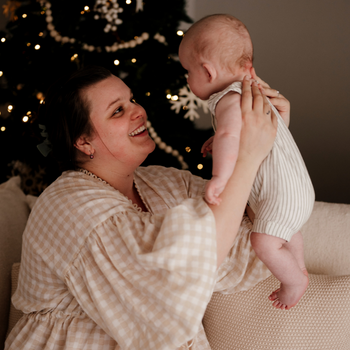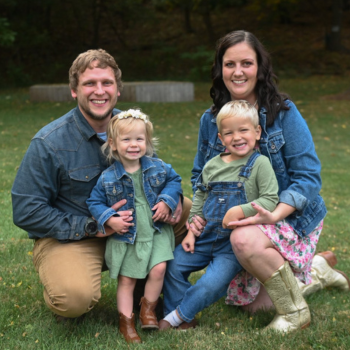
Joy Comes In the Morning Part Two
December 09, 2022 By Sarah H

Part Two (read Part One here)
We moved to the OR for an emergency C-section fast, and I counted my breaths the whole way with my eyes closed as my lower half continued to convulse. The OR was swarming like a hive, with a bunch of people all doing different jobs, preparing instruments I tried not to look at. As soon as I was flat on my back, my arms were tightly strapped down, a blue curtain went up and the surgical team started the procedure. Being held down and restrained only made me feel more trapped, and my flight response continued to grow even though I couldn't move. I could feel the aggressive tugging and stretching in my abdomen, like a pair of shoes bouncing around in a washing machine.
A few minutes from the start of the surgery, the curtain came down and there you were; covered in goo, squinting under the surgical lights with the biggest pout I'd ever seen. You started to cry, and so did I. All I could see was your perfect little button nose. Holding you wasn't an option, so I snuggled my face next to yours while Dad held you next to my head and I tried to enjoy a minute of peace with you amongst all the chaos.
I was told you had to go and that I did too, because I wasn't out of danger yet and had to go to the ICU. I was immediately put on a 24 hour drip of magnesium sulfate to prevent seizures, which is notorious for making you feel sick and exhausted. I spent a few hours drifting in and out of consciousness while feeling sick, shivering and itching all over my body. I was grateful that you didn't need lots of intervention - just some glucose and a feeding tube until we could try the real thing.
Thanks to a lovely nurse, I was finally able to see you the night after you were born. Dad was giving you a cuddle when I was wheeled up to the special care unit, and you looked so comfortable.I could reach out and touch your little head and ears, which were so tiny and soft, while the nurses and midwives adjusted and re-plugged things so we could be together.
There was so much to come that I didn't know in that first moment holding you. Recovery and postpartum wouldn't be easy for us. Preeclampsia is still considered an immediate risk and danger for 6 weeks after birth, but its impact on my brain and my body would last much longer than that. You would be our little champion, putting on weight as you needed to and meeting your milestones on time even though you came early.
I'd have a much harder time.
I'd jump straight into countless follow up appointments to assess any long term damage to my body, instead of being able to focus on settling in at home with you. I'd see an optometrist to check whether I had any lasting eye damage from strokes and fluid buildup, with blurred vision and trouble focusing on things. I'd see the nephrologist who called the shots by phone on the night you were born, to check the state of my kidneys, renal function and ongoing blood pressure. I'd see a cardiologist after learning that preeclampsia can also do damage to the heart, and I'd already experienced palpitations and difficulty breathing. I'd see my dentist to check that my teeth hadn't been damaged from the extra clenching. I'd bathe in moisturiser every day because my skin itched like crazy while the fluid slowly drained from my body, and stay dry as a bone for months. I'd be told that it would be at least 6 months before I'd know what my new normal would be. Each doctor and specialist would ask me how high my blood pressure got, and the same shock would show on each of their faces. They'd tell me it was a miracle I was alive, and for some reason, that didn't make me feel better.
I'd contact my psychologist as soon as I was out of the ICU, knowing that I needed to get on top of my brain before it got away from me, and I'd resume my antidepressants within a fortnight of your birth. I'd be referred to a perinatal trauma therapist for specialised mental health care and to learn to trust my body again. I had to work really hard to practice grounding skills, and processing your birth through EMDR therapy. Going on that therapy journey helped me acknowledge the loss and the grief and the realisation that what should have been a sacred and bonding experience was broken and taken away.
I'd need the highest dose possible of blood pressure medication to stay stabilised and out of hospital, and daily injections for several weeks to prevent blood clots, leaving me with big and itchy rainbow bruises all over my stomach and legs. I'd wonder if I'd ever be able to stop taking the beta blockers, or if I'd ever be able to have my blood pressure checked without feeling panicked.
I'd feel frustrated and angry when people would ask for my story and then compare other births to mine. I'd hear all about the long labours, the unplanned C-sections, the failed epidurals and the mean midwives. All of those things are valid and real and I am by no means the gatekeeper of birth trauma. Those stories aren't better or worse, but they're also not the same. One minute I was watching TV and eating dinner, and not that many minutes later, I was having my son removed from my body while I lay on an operating table with no idea whether I would survive. I'm yet to hear someone say "I know how you feel" and actually believe that's true.
This story is hard for me to tell, took a long time to write and even longer to share. I need to honour the struggle, the trauma and the fear. It's a radical thing to sit in the space of discomfort and loss, in a world that pressures us to jump to the happiness and the good things straight away. I learnt long before this experience that for me to heal, I need to sit in the hard space for a while first. I have to give the 'what if's some time in the spotlight so they don't eat me alive, before the moving forward can happen.
Preeclampsia stole a lot from me, and gave me a lot that I didn't want or ask for. I know that I'm one of many who look back on the birth of their child and don't see it as a happy day. There are so many people who have almost died bringing their babies into the world, or watched their loved ones nearly lose their life. There are many people, adults and babies alike, who have lost their lives because of preeclampsia, and many other diseases, diagnoses, tragedies and mistakes. I consider myself blessed to be here, and thank God every day that I survived to be your Mum.
Read the full story here

I am a two-time survivor of postpartum preeclampsia. I am also a Licensed Professional Counselor and specialize in treating trauma in youth during...
ReadMore- Trust Your Gut, Mama: Our Preeclampsia Journey December 08, 2025
- Grief and Gratitude can Coexist November 25, 2025
- Almost Didn’t Make It November 24, 2025
- Callan’s Birth Story November 24, 2025
- Marlene’s Preeclampsia and Hellp Syndrome Story November 24, 2025
- My Nightmare November 24, 2025
- Welcome To the World Little Fighter November 24, 2025
- Listening To My Body Saved My Life November 24, 2025
- Traumatic Birth For My First Boy but A Healthy Baby November 24, 2025
- the World May Not See, but My Daughters Will An Honest Look At the Mess, the Love, and the Unseen Labor Of Motherhood By Kayla Lynn November 24, 2025
